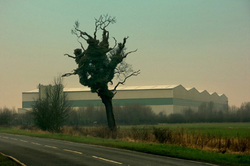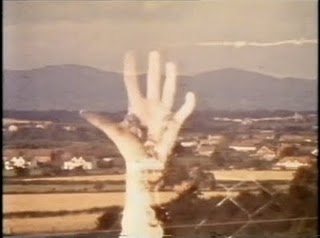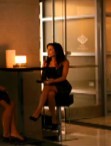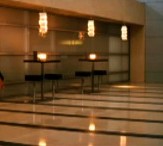From Fisher's website:
What are grey vampires and how do they retard the insurrectionary potential of digital discourse? How does Derrida’s notion of hauntology contribute to an understanding of dubstep artist Burial? Is ‘Basic Instinct 2’, routinely derided as a cine-atrocity, a Lacanian reworking of Ballard, Baudrillard and Bataille in service of the creation of a “phantasmatic, cybergothic London”? What is interpassivity and in what ways has it come to define the corporatized incarceration of modern academia?
Over the last decade, Mark Fisher has established a reputation as one of the exhilarating cultural theorists in Britain. A co-founder of the Cybernetic Culture Research Unit (CCRU) at Warwick University – and described by Simon Reynolds as the academic equivalent of Apocalypse Now’s Colonel Kurtz – he brings together psychoanalysis, political analysis and speculative fiction to create an extraordinary body of rogue scholarship, a theory-rush with few parallels.
Fisher is the author of ‘Capitalist Realism’, the editor of ‘The Resistible Demise of Michael Jackson’ (both Zer0, 2009), and writes regularly for Sight and Sound, Film Quarterly, The Wire and Frieze, as well as maintaining a well-known blog at k-punk.abstractdynamics.org. He teaches at the University of East London, Goldsmiths, University of London, and the City Literary Institute.
The Colloquium for Unpopular Culture and NYU’s Asian/ Pacific/ American Studies program are pleased to be hosting Fisher’s first talks in America.
http://pontone.pl/pontones-special-guest-mix-k-punk-the-metaphysics-of-crackle/
--
MARK FISHER, THERE ARE NON-TIMES AS WELL AS NON-PLACES: REFLECTIONS ON HAUNTOLOGY
 |  |
 |   |
WHEN: Wednesday 4 May 2011, 6:30pm
WHERE: Room 471, 20 Cooper Square [East 5th and Bowery]
FREE AND OPEN TO THE PUBLIC
“Through their generic and transient qualities – workstations devoid of personal effects, relations with colleagues as fleeting as those with passengers on a commuter journey – many workplaces now resemble non-places, either literally, as in the case of a hotel, corporate coffee chain or out-of-town supermarket, or symbolically, in the form of temporary assignments for faceless employers (dis)located in anonymous buildings, where the worker-commuter then follows the same global timetables, navigates the same software applications and experiences the same sense of placelessness, the feeling of being mere data in the mainframe.”
So writes Ivor Southwood in his analysis of precarious labour, ‘Non-Stop Inertia’ (2011). In the last decade, the proliferation of corporate non-places has been accompanied by the spread of cyberspace-time, or Itime, a distributed or unpunctuated temporality. It’s no coincidence that, as this unmarked time increasingly came to dominate cultural and psychic space, Derrida’s concept hauntology (re)emerged as the name for a paradoxical zeitgeist. In ‘Specters of Marx’, Derrida argued that the hauntological was characterised by “a time out of joint”, and this broken time has been expressed in cultural objects that return to a wounded or distorted version of the past in flight from a waning sense of the present. Sometimes accused of nostalgia, the most powerful examples of hauntological culture actually show that nostalgia is no longer possible. In conditions where pastiche has become normalised, the question has to be: nostalgia compared to what?
James Bridle has recently argued that “the opposite of hauntology ... [is] to demand the radically new”, but hauntology in fact operates as a kind of thwarted preservation of such demands in conditions where - for the moment at least - they cannot be met. Whereas cyberspace-time tends towards the generation of cultural moments that are as interchangeable as transnational franchise outlets, hauntology involves the staining of particular places with time - albeit a time that is out of joint. In this lecture, Fisher will explore the hauntological culture of the last few years in relation to the question of place, using examples from music (Burial, The Caretaker, Ekoplekz, Richard Skelton), film (Chris Petit, Patrick Keiller) and fiction (Alan Garner, David Peace).
--
MARK FISHER, DEPACIFICATION PROGRAM: FROM CAPITALIST REALISM TO POST-CAPITALISM
WHEN: Thursday 5 May 2011, 6:30pm
WHERE: Room 471, 20 Cooper Square [East 5th and Bowery]
FREE AND OPEN TO THE PUBLIC
“It would be best, perhaps, to think of an alternate world - better to say the alternate world, our alternate world - as one contiguous with ours but without any connections or access to it. Then, from time to time, like a diseased eyeball in which disturbing flashes of light are perceived or like those baroque sunbursts in which rays from another world suddenly break into this one, we are reminded that Utopia exists and that other systems, other spaces, are still possible.” (Fredric Jameson, ‘Valences of the Dialectic’)
In his 2009 book ‘Capitalist Realism’, Mark Fisher started to explore some of the affective, psychological and political consequences of the deeply entrenched belief that there is no alternative to capitalism. After 1989, capital seemed to enjoy full spectrum dominance of both global space and the unconscious. Every imaginable future was capitalist. What has been mistaken for post-political apathy, Fisher argued, was a pervasive sense of reflexive impotence in the face of a neoliberal ideological program which sought to subordinate all of culture to the imperatives of business. The subject of post-Fordist capitalism is no passive dupe; this subject actively participates in an ‘interpassive’ corporate culture which solicits our involvement and encourages us to ‘join the debate’. As Fisher argues in the book, education has been at the forefront of this process, with teachers and lecturers locked into managerialist self-surveillance, and students induced into the role of consumers.
In the eighteen months since ‘Capitalist Realism’ was published, the neoliberal program has been seriously compromised, but capitalist realism has intensified - with austerity programs pushed through on the basis that it is unthinkable that capitalism should be allowed to fail. At the same time, this new, more desperate form of capitalist realism has also faced unexpected challenges from a militancy growing in Europe, the Middle East and even in the heartlands of neoliberalism such as the UK and the US. Now that history has started up again, and Jameson’s “baroque sunbursts” flare brighter than they have for a generation, we can begin to pose questions that had receded into the unimaginable during the high pomp of neoliberal triumphalism: what might a post-capitalism look like, and how can we get there?
Fisher will argue that the Left will only succeed if it can reclaim modernity from a neoliberal Right that has lost control of it. This entails understanding how the current possibilites for agency are contoured and constrained by the machinery of what Deleuze and Foucault called the Control Society, including cyberspace, the media landscape, psychic pathologies and pharmacology - failures to act are not failures of will, and all the will in the world will not eliminate capitalism. It also entails recognising that neoliberalism’s global hegemony arose from capturing desires which it could not satisfy. A genuinely new Left must be shaped by those desires, and not be lulled, once again, by the logics of failed revolts.

Audio from lecture: http://thehauntologicalsociety.blogspot.com/2011/05/mark-fisher-there-are-non-times-as-well.html
ReplyDeletehttp://rhizome.org/editorial/2011/may/18/hauntology/
ReplyDelete